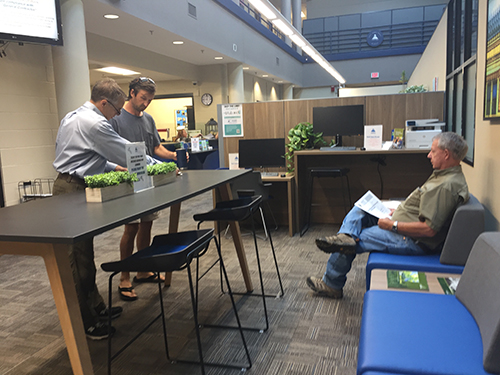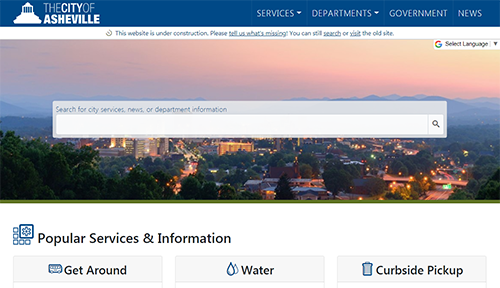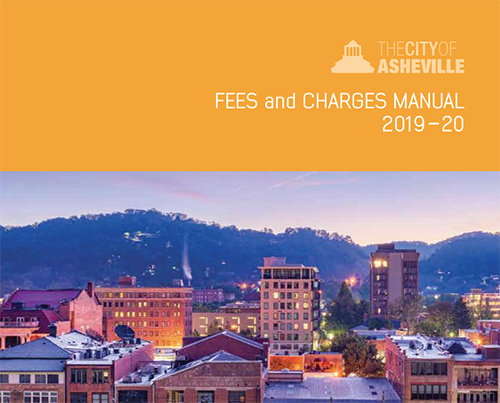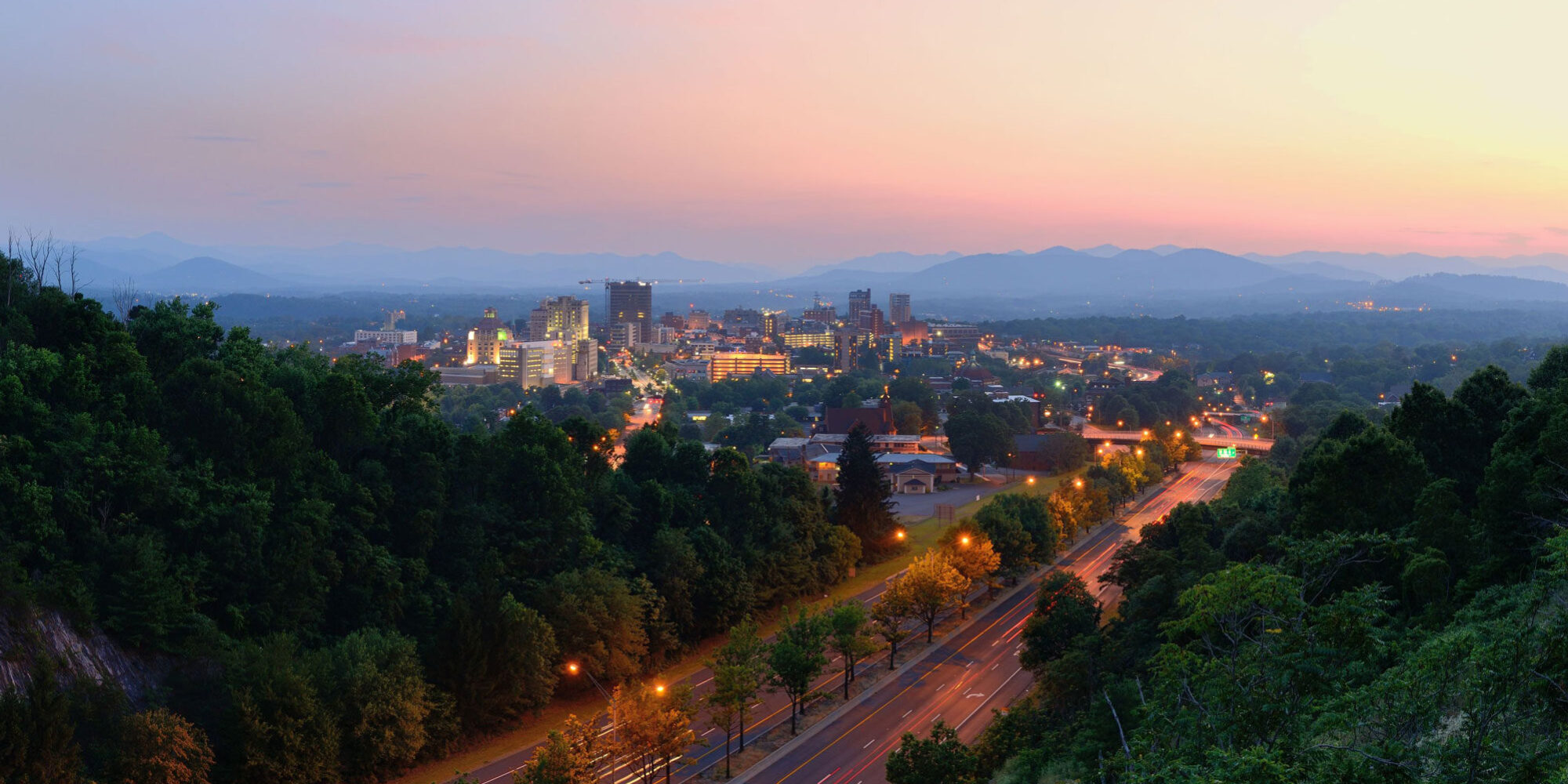Sustainability Rebate Program to be suspended on March 31, 2025
Updated City of Asheville Noise Ordinance goes into effect on Sept. 15, 2021
October 15, 2020 – Coronavirus Update: Asheville Development Services Department re-opens for limited customer service and launches 15-minute online meetings with staff
March 16, 2020 – Coronavirus Update: Asheville Development Services Department to continue business, but will close doors
New Tree Canopy Preservation Ordinance Passed by Council
Development Services Permit Application Center recently remodeled
DSD launches new online development notification tool
City of Asheville launched new services-oriented website
Fees and Charges changes for FY 2019-2020
Digital residential permitting portal update
Continuing education and training available
License Thresholds Increase
On August 16, 2023, the North Carolina General Assembly voted to override Governor Cooper’s veto of House Bill 488. Included in the bill was a provision that increased the project threshold pursuant to NCGS 87-1 to $40,000 effective October 1, 2023.
No permit issued under Article 9 or 9C of Chapter 143 of the General Statutes is required for any construction, installation, repair, replacement or alteration performed in accordance with the current edition of the North Carolina State Building Code costing forty thousand dollars ($40,000) or less in any single-family residence, farm building, or commercial building, unless the work involves any of the following:
- The addition, repair, or replacement of load-bearing structures. However, no permit is required for replacement of windows, doors, exterior siding, or the pickets, railings, stair treads, and decking of porches and exterior decks that otherwise meet the requirements of this subsection.
- The addition or change in the design of plumbing. However, no permit is required for replacements otherwise meeting the requirements of this subsection that do not change size or capacity.
- The addition, replacement, or change in the design of heating, air-conditioning, or electrical wiring, devices, appliances or equipment, other than like-kind replacement of electrical devices and lighting fixtures.
- The use of materials not permitted by the North Carolina State Building Code.
- The addition (excluding replacement) of roofing.
- Any changes to which the North Carolina Fire Prevention Code applies.
General Contractor License
Any work bid or contracted for less than $40,000 does not require a license as of the effective date October 1, 2023.
Owner Exemption
Who is eligible for the “owner-contractor” exemption? A property owner can act as his own general contractor and thus be exempt from the requirement to hire a licensed general contractor for building projects costing $40,000 or more if the property owner (including the owner’s family) intends to solely occupy the building being altered or built on his property. If the building is not solely occupied by the property owner for at least 12 months following completion of the project, it is presumed that the property owner did not intend to solely occupy the building. (G.S. 87-1(b)(2)). In addition, a property owner who acts as his own general contractor must personally supervise and manage the building construction or alteration project for which the building permit was obtained under the exemption. The property owner cannot then delegate this duty to an unlicensed person to superintend the project on his behalf. After the building permit has been obtained pursuant to the exemption, the property owner can only delegate this duty to a general contractor licensed in this state. This exemption applies to building alteration or construction projects on property owned by individuals as well as firms and corporations (including local governments). The exemption – and the criteria for eligibility under the exemption – applies to both residential and commercial building construction projects.
Lien Agent
An Appointment of Lien Agent is not required if any of the following conditions apply:
- Total cost of improvements are less than $40,000
- Improvements are to the owner’s existing residence
- Improvements are for a public building project
New Tree Canopy Preservation Ordinance Passed by Council
On Tuesday, September 8 City Council passed amendments to the Unified Development Ordinance (UDO) that created Article 19: Tree Canopy Protection. The series of amendments that were made ensure that most developments have a requirement to preserve, plant, or pay a fee-in-lieu of canopy trees on site. Below you’ll find a list of Frequently Asked Questions to help guide you in understanding this new set of requirements.
Why did the City enact these new regulations?
The City has received a great deal of feedback requesting urban forestry and tree protection regulations. Further, the Land Surface Temperature Study done in conjunction with NASA’s Develop program and the 2019 Tree Canopy Study showed increasing land surface temperatures and a loss of tree canopy that showed a need for mitigation. The new regulations are also supported by several goals of Living Asheville, the City’s Comprehensive Plan.
What types of development must comply with the new rules?
The requirement to plant, preserve, or pay a fee-in-lieu of trees applies to:
- All new commercial buildings;
- All new commercial open uses of land (like parking lots);
- Commercial building expansions over 1,500 square feet (footprint expansion);
- Open land use (again, like parking lots) expansions over 3,000 square feet;
- All subdivisions of land (not recombinations or state exemptions, but true subdivisions creating new lots)
Does this apply to new single-family homes?
No. The construction of a new one or two-family home does not trigger these requirements. A previous subdivision may result in the presence of protected trees on a site where a new home is proposed, but the building of the home itself will never trigger these requirements.
Will a new permit be required by this ordinance?
For developments that are required to comply with the ordinance, no new permit will be required. The review will be conducted as a part of the site plan review (commercial site permit, Level I, II, III, Final TRC, Minor or Major Subdivision) that is already required for the project. The City will require a new plan sheet to be included that is based on this checklist. There will be no additional fees or review time added to the process.
This ordinance also creates a new permit type to remove a tree that was preserved or planted to comply with this ordinance. This Canopy Tree Removal permit will also be required to remove trees on steep slopes and aquatic buffer areas, in place of the residential and commercial site permits that we utilized in the past. The fee for this permit is $100. It requires an online application with a photo of the tree, a site plan (as simple as a marked-up aerial), and a certification letter from an arborist.
How will developers and builders protect the trees?
The City will require that builders and developers follow a City provided standard detail to erect tree protection fencing around any tree that is preserved for compliance with Article 19 during construction.
Who is going to inspect to ensure that the trees are there and protected?
The City’s site construction inspectors will inspect the sites for tree protection during their currently required preliminary and periodic inspections.
Where can I find more information?
The following resources are available and should help you work with the new requirements:
- Public Information Presentation Start here. This Narrated presentation will take you through why, what, and how of the new requirements found in Article 19.
- Tree Canopy Requirements Calculator This will assist developers in determining what their requirements for preservation on a site are.
- Development Tree Map This interactive map will assist in finding a tree canopy coverage amount or looking up a resource management district.
- Tree Preservation Plan Checklist Shows what is required to demonstrate compliance on a plan or plan set. This should be included with the subdivision, commercial site, Level I or TRC application for any projects triggering these new requirements.
- Ordinance The new ordinance coded in the MuniCode system.
- Tree Removal Permit Application The online application for a tree removal permit. This will be added to develop.ashevillenc.gov
Development Services Permit Application Center recently remodeled
 If you have been to the Public Works building recently you likely noticed some changes happening. The Development Services Permit Application Center (PAC) lobby has gone through a complete remodel to better serve customers and improve efficiency in this work space.
If you have been to the Public Works building recently you likely noticed some changes happening. The Development Services Permit Application Center (PAC) lobby has gone through a complete remodel to better serve customers and improve efficiency in this work space.
Improvements for customers and staff:
• Creation of two self-serve kiosks where customers can access DSD’s online services quickly and easily to apply for residential permits, check permit status and schedule inspections.
• New lobby furniture incorporates more workstations where customers can talk one on one with plan review staff.
• Separation of Permit Facilitators creates an office-like experience for the customer to allow a more collaborative and secure exchange of information.
The new lobby also provides additional space for customers to meet one-on-one with the Planner of the Day (POD) and Permit Facilitators.
DSD is located in the Asheville Public Works Building, 161 S. Charlotte St. Stop by and take a look at the improvements. Let us know what you think.
DSD launches new online development notification tool
 In a time of development and growth, Asheville residents have asked how they can stay better informed about upcoming projects.
In a time of development and growth, Asheville residents have asked how they can stay better informed about upcoming projects.
We heard you and are pleased to roll out a new online tool residents can use to stay informed about upcoming development such as major subdivisions, apartment complexes, retail establishments and hotels. The site contains specific information about opportunities for public participation in the development process. Best of all, you can sign up to receive notifications when a development application is submitted for land in your area.
The new development tool is embedded in the City’s Simplicity search engine. This site, which contains all sorts of neighborhood and City services information, now also has a development tab. Click on “Development” in the lower right-hand corner to find our all new Large-Scale Development webpage. This page includes information on project types, the development process, and how and when the community can get involved.
Brought to you by the City’s Development Services and IT staff, creation of this tool was informed by surveying our residents about their preferences regarding development notification. Based on the survey data, staff developed this new notification tool that allows for opt-in email notifications of development applications submitted to the City based on geographic preferences.
These notifications will lead residents to detailed informational pages about the submitted applications for development approval.
The Large-Scale Development webpage also links to detailed, user-friendly pages and resources regarding the development review, engagement and approval process in the City of Asheville.
Want to get notifications about developments near you or for the entire city? Sign up here.
If you prefer to not get emails and to simply check in on development from time to time you can always visit this data-rich development webpage.
This development notification tool will continue to be updated as we receive feedback and suggestions. If you have any ideas for improvements or features you would like us to consider, please tell us here.
City of Asheville launched new services-oriented website
 The City of Asheville has launched a new services-oriented website, with key resident services front and center on the home page.
The City of Asheville has launched a new services-oriented website, with key resident services front and center on the home page.
The site is built with usability in mind, based on key analytics of our most visited pages and requested services. City staff worked with local vendors to build the site on the open source WordPress platform.
Over the summer City staff continue to migrate content to the new site. The site is built with continuous improvement in mind and will be adapted to the changing needs of the community.
The former website will still be available at legacy.ashevillenc.gov for several months as content continues to be migrated to the new site. The website url address remains the same www.ashevillenc.gov.
To navigate to DSD, click “Departments” in the top blue navigation bar and then “Development Services” or go directly to www.ashevillenc.gov/department/development-services.
Fees and Charges changes for FY 2019-2020
 Asheville’s fiscal year runs from July to June the following year. So most fee changes go into effect July 1.
Asheville’s fiscal year runs from July to June the following year. So most fee changes go into effect July 1.
Fees and charges are a significant revenue source for the City, comprising 35% of city-wide revenue and 10% of the General Fund revenue. These generally fall into three categories: user fees and charges; regulatory fees; and public enterprise fees and charges.
Find a complete rundown of the Fees & Charges at this link.
Digital residential permitting portal update
In February 2019, the Development Services Department (DSD) launched an online portal to accept residential permit applications following a year-long improvement process that involves all residential review staff.
The aim is for DSD to process the first round of review for complete residential permits applications within six days. To support this goal, DSD has developed a clear, user-friendly application checklist and resources, like a glossary of common terms and sample diagrams.
In addition to accepting residential permit applications online, DSD now also routes residential applications digitally to staff reviewers. Reviewers use the industry-leading Bluebeam software to review and mark-up application plans and produce comment summaries. Customers are notified by email when marked-up plans and comments or approved permits and plans are available for pick-up on the Accela Citizen Access website.
The new process eliminates the need for paper plan sets and allows for 24/7 submittal of new residential applications through DSD’s Development Portal
Between February and June, DSD received 204 new residential permit applications and 88 residential permit resubmittals online for projects including new single family homes, remodeling, repairs, accessory structures, and solar PV.
DSD continues to track metrics to identify additional improvement opportunities
DSD is currently coordinating with the City’s Water Resources Department and Buncombe County’s Metropolitan Sewerage District (MSD) to integrate three separate applications into one and to collect fees at one time for applicants’ ease.
Continuing education and training available
 Did you know that the Development Services Department offers training opportunities for professional development? Classes are held at Wesley Grant Sr. South Center, 285 Livingston St, Asheville, NC 28801 (unless noted otherwise).
Did you know that the Development Services Department offers training opportunities for professional development? Classes are held at Wesley Grant Sr. South Center, 285 Livingston St, Asheville, NC 28801 (unless noted otherwise).
For class registration or more information, contact Misty Lipe at 828-259-5658 or mlipe@ashevillenc.gov.
Below is a list of upcoming classes:
- Mechanical Code Class: Sept. 3 and 10, 1 to 4 p.m. (tentative dates). Cost: $65.
- National Electrical Code (NEC) Class for Contractors: Oct. 14-15, 6 to 10 p.m. Cost: $80.
- Electrical Journeyman Test: Oct. 15, 8 a.m. to noon. Cost: $50.
- Building Code Class: Nov. 5 and 12 (tentative dates), 1 to 4 p.m. Cost: $65.
- Plumbing Code Class: Dec. 3 and 10, 1 to 4 p.m. (tentative dates). Cost: $65.
